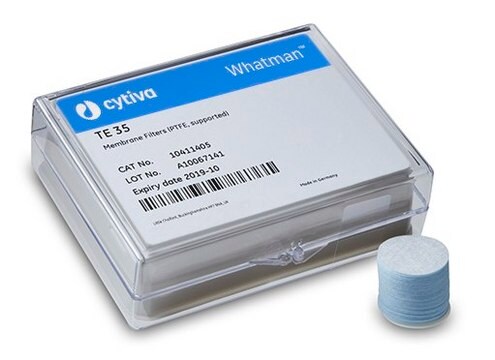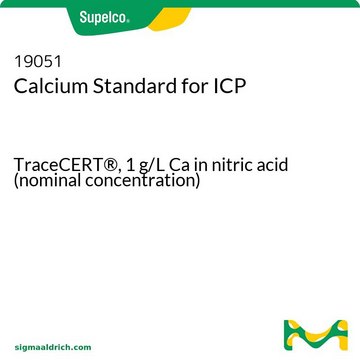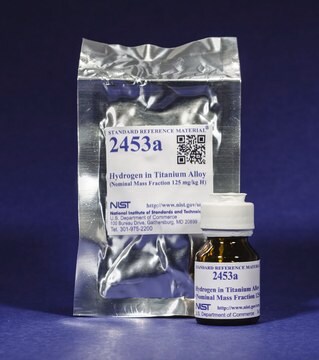FGLP14250
Membrana de filtración MF-Millipore, tamaño de poro 0,22 μm
Fluoropore®, filter diam. 142 mm, hydrophobic
Sinónimos:
Fluoropore Membrane Filter
About This Item
Productos recomendados
material
PTFE membrane
plain filter
white filter
Quality Level
sterility
non-sterile
feature
hydrophobic
manufacturer/tradename
Fluoropore®
Millipore
parameter
130 °C max. temp.
24 mL/min-cm2 water flow rate
5 L/min-cm2 air flow rate
filter diam.
142 mm
thickness
150 μm
gravimetric extractables
0.5%
matrix
Fluoropore®
pore size
0.22 μm pore size
85 % porosity
bubble point
≥1.0 bar, air with methanol at 23 °C
shipped in
ambient
General description
Our Omnipore membrane is a hydrophilic PTFE membrane that is compatible with virually all solvents, acids, and alkaline solutions.
Features & Benefits:
- Biologically and chemically inert
- High porosity yields high flow rates
- Hydrophobic and hydrophilic PTFE varieties available for filtration of aqueous and organic-based samples
Applications:
- Fluoropore Membrane: Clarifying Acids, Bases and Solvents; Air Monitoring; Filtering and Venting Gases; UV Spectroscopy
- Omnipore Membrane: Filtration of Aqueous Solutions, Clarifying Acids and Alkaline Solution
Application
- Clarifying acids, bases, and solvents
- Filtering or venting gases
- UV spectroscopy
- Particle monitoring
- HPLC, UPLC, LC-MS/MS mobile phase filtration
- Microplastics analysis
Other Notes
- Organism Retention: Microorganism
- Mode of Action: Filtration (size exclusion)
- Application: General laboratory filtration
- Intended Use: Retention or removal of biological contaminants
- Instructions for Use: Sterilizing filtration of a liquid through a membrane with a 0.2 μm (or smaller) pore size effectively removes biological contaminants, including bacteria, mold and yeast
- Storage Statement: Store in dry location
- Disposal Statement: Dispose of in accordance with applicable federal, state and local regulations.
Legal Information
Storage Class
10-13 - German Storage Class 10 to 13
Certificados de análisis (COA)
Busque Certificados de análisis (COA) introduciendo el número de lote del producto. Los números de lote se encuentran en la etiqueta del producto después de las palabras «Lot» o «Batch»
¿Ya tiene este producto?
Encuentre la documentación para los productos que ha comprado recientemente en la Biblioteca de documentos.
Nuestro equipo de científicos tiene experiencia en todas las áreas de investigación: Ciencias de la vida, Ciencia de los materiales, Síntesis química, Cromatografía, Analítica y muchas otras.
Póngase en contacto con el Servicio técnico



